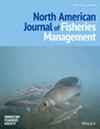季节性象拔蚌(Panopea generosa)显示因子的长期观察
IF 1.4
4区 农林科学
Q3 FISHERIES
引用次数: 0
摘要
摘要象拔蚌显示因子是指在种群评估调查中,潜水员能发现一只象拔蚌的概率。本文介绍了从不列颠哥伦比亚省滨海岛附近的长期显示因子样地收集的数据中估计象拔蚌显示因子的三种方法。潜水员在32个月的时间里对这些地块进行了21次调查。其中两种方法在数据收集时估计显示因子,而第三种方法将显示因子作为一年中时间的函数。这三种方法都产生概率结果。每种显示因子分析方法都显示出强烈的季节性影响。显示因子在3月至6月期间最高,在10月至12月期间最低。高低显示因子之间的差异至少是两个因子中的一个。这三种方法产生的显示因子估计值通常低于以前用作不列颠哥伦比亚省海岸种群评估的一部分的值。因此,有可能先前对显示因子的估计对象拔蚌丰度的估计产生了负偏差。作为辅助目标,本文提出了一种从长期显示因子数据中去除异常值的策略。异常值没有改变总体趋势,但确实影响了定量结果。本文章由计算机程序翻译,如有差异,请以英文原文为准。
Estimating Seasonal Geoduck (Panopea generosa) Show‐Factors from Long Term Observation
The geoduck show‐factor is the probability an individual geoduck is detectable to a diver during a stock assessment survey. This paper presents three methods to estimate geoduck show‐factor from data collected from long term show‐factor plots near Marina Island, British Columbia. Divers surveyed the plots 21 times over a 32‐month period. Two of the methods estimate show‐factors at the time of data collection while the third method treats show‐factor as a function of the time of year. All three methods generate probabilistic results.Each method of show‐factor analysis indicated a strong seasonal effect. Show‐factors were highest from March to June and lowest from October to December. The difference between the high and low show‐factors was at least a factor of two.The three methods generated estimates of show‐factor that are generally lower than the values previously used as part of stock assessment on the coast of British Columbia. As a result, there is the possibility that previous estimates of show‐factor contributed a negative bias to estimates of geoduck abundance.As an ancillary objective, this paper presents a strategy for removing outliers from the long term show‐factor data. Outliers did not change the general trends but did affect the quantitative results.
求助全文
通过发布文献求助,成功后即可免费获取论文全文。
去求助
来源期刊
CiteScore
2.60
自引率
18.20%
发文量
118
审稿时长
2 months
期刊介绍:
The North American Journal of Fisheries Management promotes communication among fishery managers with an emphasis on North America, and addresses the maintenance, enhancement, and allocation of fisheries resources. It chronicles the development of practical monitoring and management programs for finfish and exploitable shellfish in marine and freshwater environments.
Contributions relate to the management of fish populations, habitats, and users to protect and enhance fish and fishery resources for societal benefits. Case histories of successes, failures, and effects of fisheries programs help convey practical management experience to others.

 求助内容:
求助内容: 应助结果提醒方式:
应助结果提醒方式:


